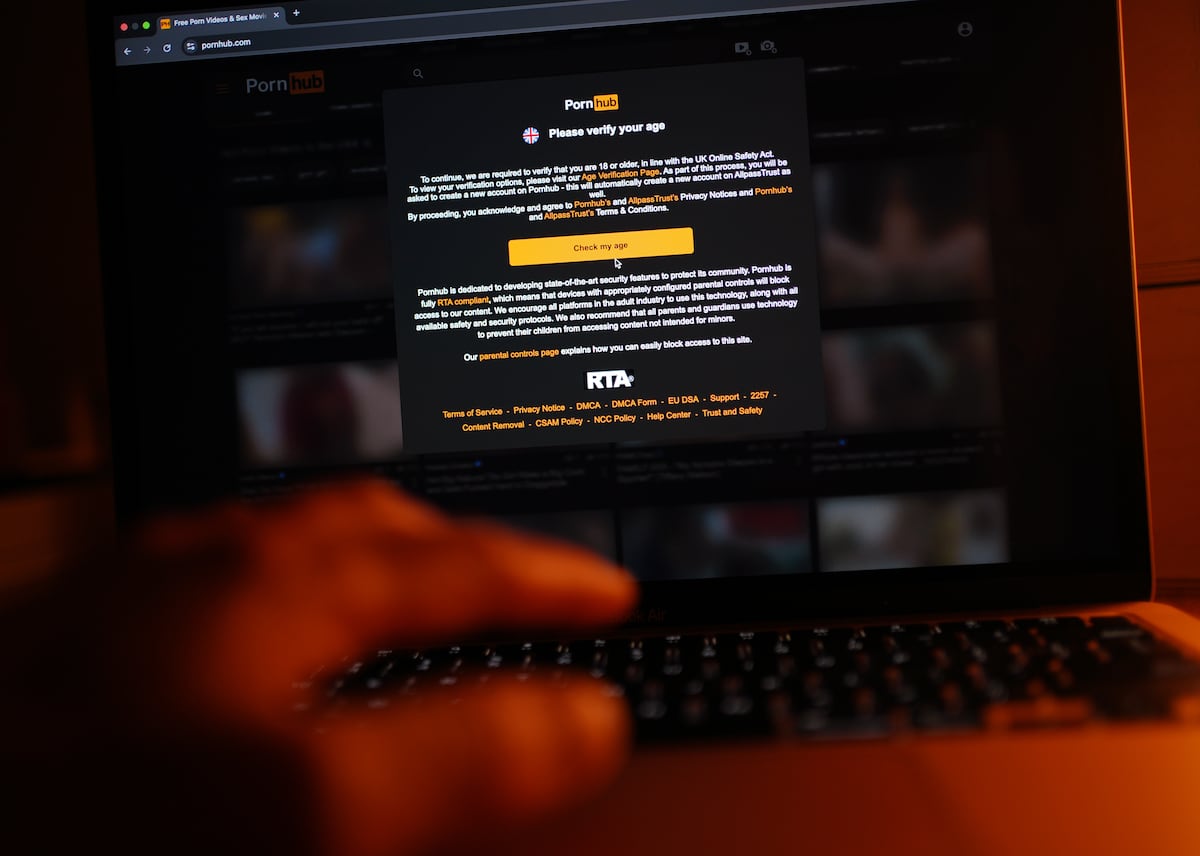The United Kingdom is beginning to assess the effectiveness of its new internet age verification protocol, which, since July 25, requires more robust measures to prevent those aged under 18 from accessing potentially harmful material, ranging from pornography to content about suicide, self-harm, and eating disorders. Initial analyses of online traffic suggest that the rules are having an impact. Platforms like Pornhub, the most-visited site for accessing pornographic material, have seen a drop in visitors of nearly 50% in the days following the entry into force of the new restrictions. It establishes up to seven options for verifying age, including facial recognition, bank card verification, or proof of identity (the UK does not have national ID cards).
According to analysis by data firm Similarweb, the downward trend among the most popular sites is widespread. Pornhub lost more than a million visitors in just two weeks, dropping from 3.2 million to two million. Similarweb compared the average number of daily users collected from August 1 to 9 with the average number of users in July. The figures appear conclusive: Pornhub experienced a 47% drop from the day before the new system went into effect to August 8.
The pattern is similar on other platforms offering similar content, such as XVideos, whose traffic fell at exactly the same rate as the leading platform, or OnlyFans, the subscription service popular for the pornographic content uploaded and consumed by its own users. The latter experienced a 10% decline. This evolution is the result of the implementation of the so-called Online Safety Act, a controversial piece of legislation that, seven years in the making, has detractors on both sides: those who believe it represents an unacceptable invasion of privacy, and those who believe it doesn’t go far enough to protect minors.
The objective of the legislation is simple: to make it significantly more difficult for children and adolescents to access explicit material online. In practice, however, achieving this goal is more complex, which has generated a profound debate about the scope of a piece of legislation that, according to the government, makes the United Kingdom “the safest country” in which to surf the internet.
The European Commission selected Spain in May for the pilot project to develop an age verification tool to protect minors from adult content available on the internet. This came after the Spanish government developed the Digital Wallet Beta application, a system to verify that users who want to view pornographic websites are not minors. This system became popular among the initiative’s opponents, who believe that the system invades online privacy and, in reality, will only encourage teenagers to visit more hidden and dangerous websites. The debate is similar in the rest of Europe. In Italy, parental controls are mandatory for cell phones purchased in the name of minors, but nothing prevents them from using the names of other adults. In France, the implementation of a system similar to Spain’s is being explored.
According to data from Similarweb in the United Kingdom, in the face of the widespread decline of large providers of adult content online, other smaller — and also notably less-regulated — sites have experienced an increase in traffic. In fact, Ofcom, the telecommunications regulator responsible for ensuring compliance with the Online Safety Act, has already opened around half a dozen investigations into companies operating dozens of pornographic sites for violating age verification requirements.
Since the law came into force, more than 6,000 providers of adult material have pledged to use tools in the UK to ensure users are over 18 years of age. But alongside this commitment, Britons have detected patterns that appear directly related to the activation of age verification mechanisms. So-called VPN (Virtual Private Network) applications were the most downloaded in the days following the entry into force of the Children’s Code of the Online Safety Act.
Since its purpose is to hide the user’s geographic location, giving the impression that they are in a different country, its recent surge in popularity suggests a more than tangential correlation with the new verification system. According to Ofcom, some 14 million people in the UK consume online pornography, and the fear is the exposure of minors.
However, there have been critical voices regarding the legislation, who warn that without access to the most popular platforms, the alternative is to search for pornography among other options on the so-called “dark web,” which tends to offer more extreme content, which could have even more harmful consequences for young people.
The debate is intense and has fervent supporters on each side. Those who believe the new rules violate privacy have had more than 400,000 people sign a petition demanding the withdrawal of the Online Safety Act, a possibility already ruled out by the government. These concerns are countered by those who believe the rules are unworkable in practice, given the mechanisms for circumventing them. In the middle of the two camps, Ofcom maintains that, while the measures are not a “miracle solution,” they make the internet a safer place for minors by reducing the chances of them encountering potentially toxic material.
Sign up for our weekly newsletter to get more English-language news coverage from EL PAÍS USA Edition

